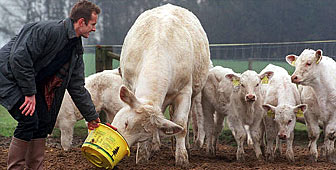
Switzerland moots export ban on meat and bone meal

Switzerland is considering an export ban on feed made from meat and bone meal. The issue has come to the fore following France's decision to impose a moratorium on the feeding of such meal to pigs and poultry.
The Federal Veterinary Office told swissinfo that the issue of an export ban had been raised in the wake of plans to ban such feed in Switzerland.
A moratorium on the use of meat and bone meal for cattle feed was imposed in 1990, and a similar ban for pigs and poultry is expected to come into force shortly.
“The question we have to solve,” said Heinz Müller of the Veterinary Office, “is whether we can then ethically export the meat and bone meal currently fed to pigs and poultry, if there’s a chance that it is in any way infected.”
The Swiss and French bans come in the wake of the crisis over Mad Cow Disease – or BSE (Bovine Spongiform Encephalopathy) – which is thought to have been caused by the feeding of meat and bone meal to cattle.
Suggestions that Mad Cow Disease has crossed over to humans causing so-called new-variant Creutzfeldt Jakob Disease (CJD) has fuelled even greater concern.
At the moment, Switzerland produces 100,000 tonnes of meat and bone meal each year. About 5,000 tonnes are sold on the domestic market for pig and poultry feed, while most of the rest is exported to Germany, Denmark and the Netherlands.
The effect of ban on Swiss exports would be to leave the country with the problem of what to do with large stocks of such meal. A kilogramme of beef produces roughly the same amount of waste, and much of it is recycled into meat and bone meal.
One solution being considered by the Federal Veterinary Office is incineration. But this is a very costly process.
“Incinerating is the best method to eliminate any health risk, but we haven’t done it so far because it is very expensive,” Müller said.
He added: “Until now we thought that ecologically, ethically and economically such a move would not have been justified. Now, however, we realise that drastic measures have to be taken to reduce the risk of infectivity to our animals.”
swissinfo with agencies

In compliance with the JTI standards
More: SWI swissinfo.ch certified by the Journalism Trust Initiative



































You can find an overview of ongoing debates with our journalists here . Please join us!
If you want to start a conversation about a topic raised in this article or want to report factual errors, email us at english@swissinfo.ch.